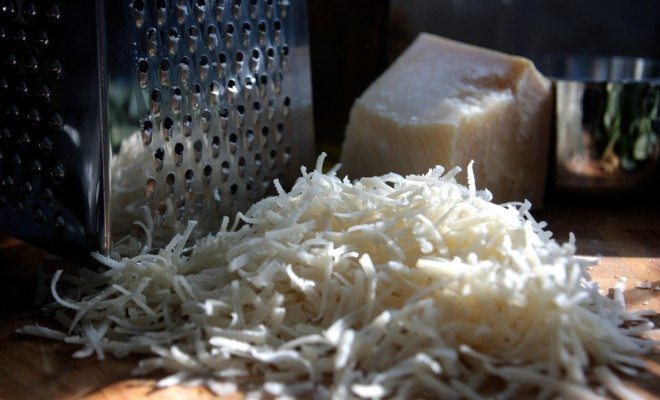 "cheese shredding" courtesy of [tracy benjamin via Flickr]
"cheese shredding" courtesy of [tracy benjamin via Flickr]
Law
Lawsuits Against Shredded Cheese Producers Continue Over Wood Pulp Controversy
Kraft Heinz and Walmart are being sued over the alleged use of wood pulp in their shredded cheese products. The lawsuits were filed in both Pennsylvania and California, in part in response to a story in Bloomberg last month that described FDA investigations into cheese producers who included wood pulp and cheaper cheddar cheese in the shredded cheeses they labeled as pure parmesan.
That Bloomberg article also looked into a number of other popular parmesan cheese brands to see if their contents included wood pulp, and the results and media coverage sparked outrage across the U.S. Now, some of those angered consumers are taking Kraft Heinz and Walmart to court over the use of wood pulp in their cheeses.
Bloomberg looked into the contents of some of the popular shredded cheese brands. The article reported:
Cellulose is a safe additive, and an acceptable level is 2 percent to 4 percent, according to Dean Sommer, a cheese technologist at the Center for Dairy Research in Madison, Wisconsin. Essential Everyday 100% Grated Parmesan Cheese, from Jewel-Osco, was 8.8 percent cellulose, while Wal-Mart Stores Inc.’s Great Value 100% Grated Parmesan Cheese registered 7.8 percent, according to test results. Whole Foods 365 brand didn’t list cellulose as an ingredient on the label, but still tested at 0.3 percent. Kraft had 3.8 percent.
Cellulose is added in to shredded cheese because it prevents clumping inside the bag. It can also be found in ice cream, and certain types of packaged pastries, as well as other popular commercial food products.
Cellulose isn’t necessarily harmful for humans to consume. As Jaydee Hanson, Policy Director at the Center for Food Safety explained:
You’d have to eat an awful lot of cheese for the cellulose to affect you. Most consumers don’t know but there’s actually cellulose in all kinds of foods — cereals, for instance. Basically, anything that is labeled ‘added fiber’ probably has cellulose in it.
However, the lawsuit is based on the fact that customers feel like they were defrauded when they purchased cheese that was mislabeled. So far, lawsuits have filed against Kraft Heinz and Walmart specifically, but given that the “wood pulp in shredded cheese” story doesn’t seem to be dying down, we may see similar lawsuits as the controversy continues to unfold.








Comments